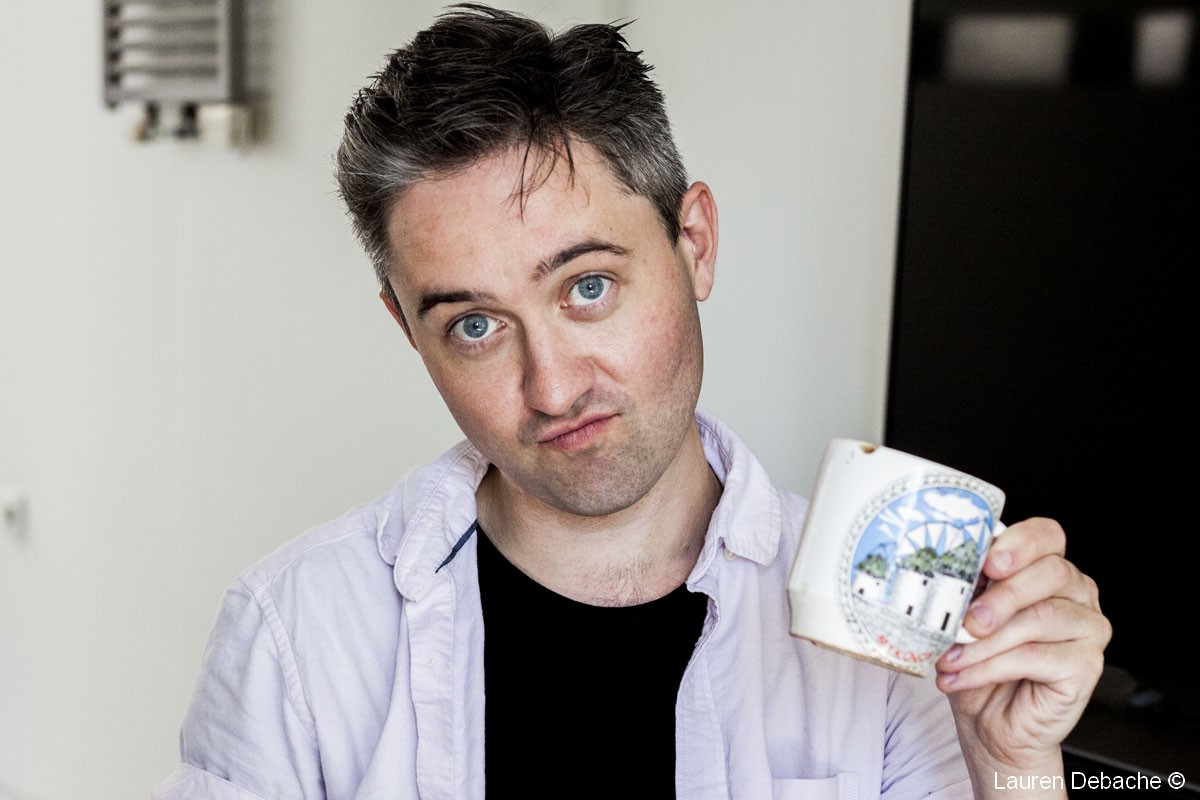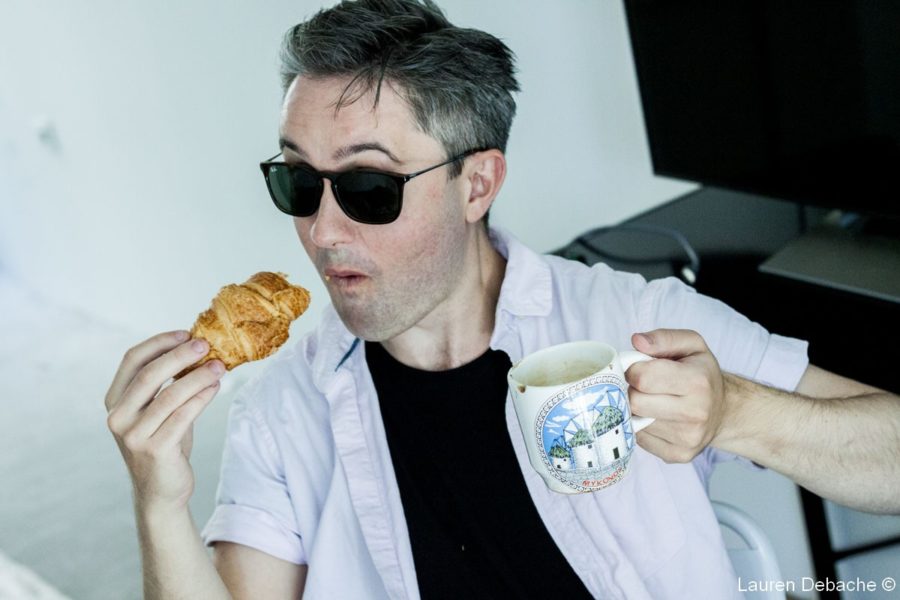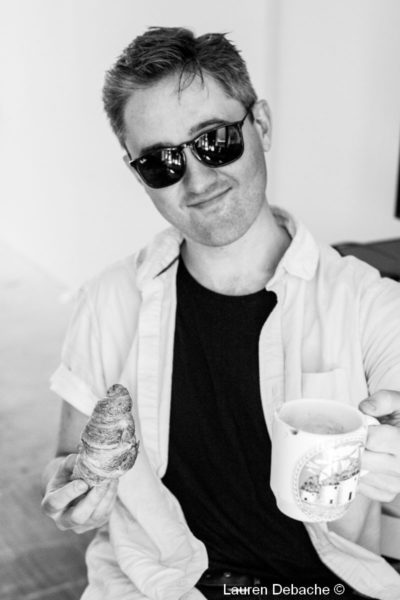
16 Sep Interview : Conor O’Brien de Villagers
À quelques jours de la sortie du nouvel album de Villagers, The Art Of Pretending to Swim, nous nous sommes entretenus avec Conor O’Brien pour en apprendre un peu plus sur ce 5ème opus qui ne semble avoir rien en commun avec les précédents. Nous en avons profité pour avoir plus d’informations sur la tournée imminente du groupe !

Les titres du dernier album, Where Have You Been All My Life, étaient majoritairement des ré-interpretations d’anciens titres. Quand as-tu commencé à travailler sur ces nouveaux morceaux ?
Conor : Certains morceaux sont très vieux. J’ai écrit le premier il y a six ans, mais la plupart ont été écrits il y a deux ans. J’ai commencé à composer à Castle Gregory sur la côte ouest, dans la péninsule de Donegal, qui est un endroit très beau en Irlande. Je suis resté une semaine là-bas, chez des amis, et j’ai commencé à écrire. Ensuite je suis rentré à Dublin, j’ai installé un studio en ville et j’y ai écrit le reste. Cela m’a pris environ deux ans. La première année, j’ai appris à installer un studio, à mixer correctement, je voulais apprendre à maîtriser ProTools, j’ai beaucoup lu sur le sujet.
Un album tous les deux ou trois ans, c’est une bonne fréquence pour toi ?
Conor : C’est une question difficile ! Je ne peux pas contrôler la vitesse à laquelle j’écris. Je suis obsédé à 100% par la musique, mais ça ne veut pas dire que j’écris rapidement. Parfois je suis très lent, j’ai besoin de prendre mon temps, je dois laisser à la chanson le temps de grandir, de devenir cette âme dans la mienne, ce gros mélange liquide d’âme ! (rires).
Tu as abandonné ta vieille guitare folk pour utiliser des synthés, des voix de robots et même des cris de mouette… Comment te sens-tu, hors de ta zone de confort ?
Conor : Il y a de la guitare dans cette chanson aussi, je pense que l’assemblage de sons est très intéressant. Si tu ne sors pas de ta zone de confort, il n’y a aucun interêt à faire un album, autant en profiter pour te tester, essayer des sonorités bizarres, te poser des questions, c’est ainsi qu’une chanson prend forme. Je suis un faux musicien folk, en réalité.
Tu chantes d’une façon différente dans certains titres, comme Again, ou Long Time Waiting, est-ce que c’est volontaire ? Voulais-tu que même ta voix ait un son différent dans cet album ?
Conor : Je n’essaie pas de chanter d’une autre façon, je fais simplement de la musique, j’essaie constamment de nouvelles choses, c’est un long voyage. Je ne peux pas chanter comme avant car je suis une personne différente aujourd’hui.

Il y a beaucoup d’instruments à cordes et à vents dans cet album, comment comptes-tu en retranscrire l’atmosphère sur scène ?
Conor : Je connais un musicien qui joue de la trompette et du synthé, parfois il joue des deux simultanément. Notre batteur sait aussi jouer du bulge, et je vais amener deux cuivres sur la tournée. Nous utilisons un logiciel qui transmet des informations de l’ordinateur aux synthétiseurs, nous avons mis en place tout un système, j’ai hâte de vous montrer.
Tu as toujours une idée précise quand à l’apparence de la pochette de tes albums. Des artistes ont fait les pochettes de tes deux derniers opus, qui a travaillé sur celle-ci ? Quelle histoire se cache derrière ces formes et ces couleurs ?
Conor : Mon ami Niall McCormack a réalisé la pochette, il travaille sur des albums qui ressortent, des vinyles… Il fait également des couvertures de livres. J’ai toujours beaucoup apprécié son travail, alors je l’ai appelé, je lui ai dit « serais-tu prêt à travailler sur une pochette qui aurait la même atmosphère que les couvertures des livres modernistes des années 70 sur le minimalisme » car j’adore cette période artistique. Je l’ai rendu fou, il m’envoyait régulièrement de nouvelles idées, et je lui répondais toujours « non ce n’est pas exactement ça. »
Ensuite nous nous sommes vus, nous avons travaillé ensemble sur le projet et nous avons trouvée une solution. Je voulais quelque chose qui ne soit pas figuratif mais qui soit simple, qui donne l’impression que l’album est basé sur l’idée de routine, qu’il forme une boucle. Je voulais que les couleurs montrent aussi cette idée. Si tu regardes en haut de la pochette, tu peux voir une roue et ce sont toujours les mêmes couleurs qui reviennent, de manière cyclique. Cet album est aussi un album cyclique, un cycle de foi. Une personne perd sa foi puis la re-gagne, puis la perd à nouveau…Ce qui donne la chanson Again.
À part une date à Dublin, la tournée passe surtout par l’Europe et le Royaume-Uni, avant de se terminer en Irlande. Comment l’expliques-tu ?
Conor : Je ne sais pas trop, c’est très étrange, cela nous arrive à chaque fois. Je pense que c’est parce que mes agents sont au Royaume-Uni, le label aussi. Quand nous retournons en Irlande, c’est vraiment cool, parce que nous avons fait toute une tournée avant, et nous sommes rodés. J’ai posé la question une fois, mais je n’ai jamais eu de réponse.
Tu vas jouer dans de nouveaux endroits, ça te fait peur ? Tu es excité ?
Conor : Je suis excité, je n’ai pas peur. Je suis vraiment content parce que nous jouons dans tant d’endroits, des endroits où il fait encore chaud, je pense. Nous allons en Italie… Je pense que l’année prochaine, nous irons aux États-Unis.
Parlons de la chanson Love Came, qui pourrait être l’une des chansons les plus sombres que tu aies jamais écrites. Elle s’est tranché le cœur avec une lame, le bruit de la lame frappant le lavabo… Cela rappelle le coup de feu à la fin d’I Saw The Dead. Quelle est l’histoire de cette chanson ?
Conor : Je me souviens d’avoir pensé à cette fille en particulier que je connais et j’ai commencé à inventer une histoire dans ma tête à son sujet, parce que je ne la connais pas vraiment en réalité. Je la vois tous les jours, elle fait du vélo sur la même route que moi quand je pars travailler dans le studio de mes amis, j’avais juste cette histoire imaginaire dans ma tête parce qu’elle semble un peu déprimée quand je vois son visage. Alors j’ai inventé une histoire d’amour qui ne s’est pas très bien passée pour elle, sur le fait que même si l’amour nous rend idiot, nous y retournons même si parfois il nous abîme le coeur.
La chanson Ada a le même titre que la chanson de The National. Vous avez joué comme première partie pour eux récemment. Ont-ils une grande influence ?
Conor : Oui. C’est le seul groupe sur lequel tout le groupe s’est mis d’accord, il y a des années, lors de nos tournées. C’était le seul groupe que tout le monde acceptait d’écouter dans le van, quand ils ont sorti BloodBuzz Ohio. J’ai toujours adoré leurs chansons, déjà à l’époque d’Alligator (ndlr : 2005). J’adore aussi l’EP Cherry Tree. J’ai tellement aimé cet EP que je l’ai écouté un million de fois, et Alligator et Boxer… J’ai suivi toute leur carrière. Ils nous ont demandé de venir en tournée avec eux, parce que nous avons déjà joué avec eux au Haldern Pop Festival en 2010 (ndlr : en Allemagne). Nous les avons rencontrés là-bas et nous nous sommes très bien entendus, nous avons de nombreux amis communs.
On sait que tu es un peu geek… Du coup on se demandait, la chanson parle-t-elle d’Ada Lovelace, la pionnière de l’informatique ?
Conor : Elle y fait référence, mais en tant que métaphore. Elle a développé un des premiers algorithmes de machines qui est fondamentalement la raison pour laquelle nous passons nos journées sur nos téléphones. C’était en 1800 et ce qu’elle a fait est beau mais aussi terrifiant. Ce genre de dualité est un fil conducteur de l’album, The Art Of Pretending To Swim est comme la vie, on ne nage pas mais on ne se noie pas vraiment non plus, on avance au fil de l’eau. C’est beau mais aussi terrifiant. Tu espères juste que personne ne remarquera que tu ne nages pas vraiment.

Dans Long Time Waiting, es-tu le sauveur dont tu parles dans la chanson ? « Quand c’est une bataille pour sortir du lit » / « tu ne peux t’aider que toi-même mais toi seul » : toi ou l’un de tes proches a-t-il dû lutter contre la dépression ? Tu sembles devenir très personnel dans cet album par moments.
Conor : C’est une chanson d’ auto-entraide. Je ne suis pas le sauveur (rires), ou peut-être que si, je ne sais pas. C’est une chanson sur la procrastination. Sur le fait de laisser des processus de pensée négative prendre le dessus sur ta vie. Les paroles du milieu sont I don’t need no validation from anyone at any course. Tu crées des batailles dans ta tête, ça te fait tergiverser. C’est une chanson qui essaie de te botter le cul, c’est pourquoi il y a beaucoup de rythmes de batterie dedans.
Prévois-tu de jouer de la batterie en tournée ?
Conor : Je pensais que je pourrais essayer de le faire une ou deux fois, que notre batteur pourrait jouer du bugle et moi de la batterie.
Dans Trick of the light, ton coeur déborde et dans Fool, il saigne : écrire des chansons est comme un processus de guérison pour toi ? C’était douloureux d’écrire ces paroles ? As-tu eu des doutes au cours du processus d’écriture ?
Conor : Oui, oui et oui ! C’est ce qu’est l’écriture, on passe par tant de processus psychologiques et d’une certaine façon c’est comme une thérapie. The Trick of he Light parle de foi, l’idée de la foi, d’observer pour des raisons joyeuses. Il s’agit un mantra méditatif de vibrations. Au milieu de la chanson les paroles sont « and we are the dawn, and we carry the sun« . Le but est d’assembler des mots pour t’insuffler de la joie de vivre, et te botter les fesses, une fois de plus.
En parlant de cette chanson, d’où t’es venue l’idée du clip? Il est plutôt surprenant…
Conor : Moi et Bob (le réalisateur ndlr.) avons eu cette idée d’un type qui déclenche un état de conscience altéré chez tout le monde, mais on ne sait pas vraiment si c’est dans sa propre tête, s’il l’imagine ou non. Même à la fin de la vidéo, tu ne sais pas si ce à quoi tu as assisté a vraiment eu lieu. La maison de disques a dit que je devais apparaître dans cette vidéo, mais je ne voulais pas y être. Ils m’ont dit » tu dois apparaître dans les vidéos « , j’ai dit » Ok, je serais dedans si je suis déguisé. »

Es-tu satisfait des résultats du vote sur la Loi sur l’avortement (Together For Yes ndlr) ?
Conor : Bien sûr. C’était la seule issue positive possible. Aujourd’hui, nous avons de vrais soins disponibles pour les personnes en difficulté à cause d’une grossesse. Nous devenons beaucoup plus progressistes sur le plan social… Il y a encore beaucoup de problèmes sur lesquels on peut travailler, mais sur le plan social, nous avons beaucoup évolué au cours des dix dernières années et ce vote constituait une infime partie d’un plus grand puzzle.
Pour finir, quel est ton meilleur souvenir de concert en France ?
Conor : Je me souviens de quelques très bons concerts au Grand Mix à Tourcoing. Il y a quelque chose de magique dans cet endroit. La Cigale aussi était très amusante, je m’en souviens très bien.
L’album The Art Of Pretending to Swim sortira le 21 septembre prochain. Le groupe jouera à Paris le 24 novembre.
———————————————————
Questions : Lauren Debache / Audrey Somnard
Photos : Lauren Debache
Your previous album was a reinterpretation of old songs, when did you start writing these new ones ?
C : One of the songs is very old. The first song was written 6 years ago, but most of them more than two years ago. I started in a place called Castle Gregory in the West Coast. On the Donegal Peninsula, which is a very beautiful place in Ireland. I have some friends there, I stayed like a week and I started writing a lot of these songs. Then I came back to Dublin, moved into the city and then I did all the rest there, I set up a studio… It’s been over two years of work. I spent the all first year learning how to build the studio, mix and record properly. I wanted to learn the protools, the synthetics, reading manuals…
One album every 2 or 3 years is a good pace for you ?
C: That’s a loaded question ! The thing about writing for me is that I can’t dictate the pace, the writing dictates my pace, I’m completely 100% obsessed with making music but it doesn’t mean I’m fast at it sometimes I’m really slow, I need it to take its time, if it’s going to be a proper song I need to let it gestate, become this soul in my soul, a soupy-soul. a big subliminal soup of soul.
You left your usual folk and guitare for experimenting with synthe, robot voice in the background, seagulls sounds even (!), how do you feel being out of your comfort zone?
C: That song has guitar in it as well, I think using sound collage is really interesting. If you’re not out of your confort zone there’s no point in making an album, you might as well taste yourself and do things which are a little bit weird to your ears so you’re kinda like « Oooh, what’s that» and then there is a song that grows. I’m kind of fake folky, I’m not really a folky person.
Your voice / way of singing is different on several songs (“Again” / “Long time waiting” / “Love came” / “Hold me down”), is it on purpose? Did you want to sound different even with your voice?
C : I’m not trying to sing in a different way, I’m just making music, experimenting all the time, that’s just a big journey, I can’t sing the same way I used to sing because I’m not the same person anymore.
There are a lot of chords, brass instruments, how do you plan to translate it live during your tour? Any change of the usual line-up for the next tour?
C : I’ve got a guy who’s playing some cornet and he plays synthesizer as well. He’s playing both sometimes. I’ve also got our drummer who plays flugelhorn. I’m gonna bring two brass on tour. We’re using something to send information from computers to synthesizers. We’ve made a whole system for this tour which is kind of cool, I’m excited.
You are very detail orientated when it comes to design your album cover, you had artists doing your artwork for the last 2 albums, who did it this time and what’s the story behind those colored shapes?
C : That’s my friend Niall McCormack, he does artwork for reissued albums, vinyles … He does book covers. I’ve always really liked his stuff and I called him and I said would you be up for doing something which has a kind of a minimalist seventies modernist book cover vibes, because I loved that era of art and then I drove him crazy because he kept sending different ideas and I was like « no that’s not it » and then we met up and we worked together and then we met up again and we figured it out and I basically wanted something which wasn’t like figurative I wanted something simplistic, that gives you the impression of the album in a simple way like the album is like quite loop, groove based, it’s got a lot of groove, and I wanted the kind of colors to represent that and also if you look at the top there is a colour wheel and the colors go from the same colors to the same solos so that’s a cyclical thing. And the album is a cyclical album because it begins and ends as a sort of cycle of faith. Someone loses their faith and regains it again and that’s the song Again.
Except for a date in Dublin, the tour is mainly going through the UK and Europe before coming back to Ireland why is that ?
C: I don’t really know, it’s weird, this always happens to us, I think it’s because my agents are n the UK, my record labels are in the UK, everyone is in Britain so I think it’s just has to work that way and when we get back to Ireland that’s like, after we’ve played so many shows, it just means the shows in Ireland are really good because we’re really tight, we played so many shows. I asked that question once but didn’t really get an answer.
You’re playing in lots of new places are you excited or scared?
Excited, I’m not scared. I’m really happy because we’re playing so many places, places which still be quite warm I think. We’re going to Italy… I think next year we’re going to go to the US.
Let’s talk about the Love came song, it could be one of the darkest song you’ve ever written. “She severed her heart with a blade”, with the noise of the blade hitting the washbowl… It reminds me of the gunshot at the end of “I saw the dead”. What’s the story of this song?
C : I remember thinking about that particular girl that I know and started making up a story in my head about her, because I don’t really know her actually. I see her everyday, she cycles the same route that I do when I’m doing studio stuff in my friends studio, I just had this imaginary story in my head because she seems kind of down when I see her face. So I made up a love story that didn’t go so well for her, it’s about how we’re kind of love fools, we go back even though we keep severing our hearts.
The song Ada is the same title as the song from The National. You played as a support for them recently. Are they a big influence?
C : Yeah. They were the only band that the whole band agreed on years ago when we’re touring. They were the only band we could agree to play in the van when they put out BloodBuzz Ohio, driving around everyone agreed to just put the national on. I was really into them before they put out Alligator (ndlr : 2005), and the Cherry Tree EP. I loved that EP so much I’ve listened to it about a million times, and Alligator and Boxer.. I just followed their whole career. They asked us to come touring with them, because we played with them before at the Haldern Pop Festival in 2010 (ndlr : Germany), we met them there and we got along very well, we have lots of mutual friends.
We know you’re a bit of a geek, is the song about Ada Lovelace, the pioneer of computer science?
C : It references her, but it’s using her as a metaphor, the central essence of things, the soul of all things except for her, she developped one of the first machine algorithms which is basically the reason that we do this all day long (shows his phone). That was in the 1800 and what she made is beautiful but also terrifying. That kind of duality is a thread to the album in a weird way, the art of pretending to swim is like life, you’re not swimming but you’re not really drowning either, you make everything up as you go along. That’s beautiful but also terrifying. You just hope that no one will notice that you’re not really swimming.
In Long time waiting, are you the savior you mention in the song? “when it’s a battle to just get out of bed” / “you can only help yourself but you alone”: did yourself or somebody close to you have to fight against depression? You seem to get very personal in this album.
C : It’s a self-help song. I’m not the savior (laughs), or maybe I’m everything I don’t know. It’s a song about procrastination. It’s about allowing negative thought processes to take your life over. The middle section is like « I don’t need no validation from anyone at any course ». You’re creating battles in your head, it’s making you procrastinate and it’s a song that tries to kick you in the ass which is why it has loads of drums.
Are you planning on playing the drums on tour ?
C : I was thinking I might try to do it once or twice. I was thinking maybe our drummer could play the flugelhorn and I could play the drums.
Your heart is “spilling over” (Trick of the light) / “bleeding” (Fool): writing songs is like a healing process for you? Was it a painful to write those lyrics? Did you have any doubts during the process?
C : Yes, yes and yes ! That’s what writing is, you go through so many psychological processes and in a way it’s like a therapy. Trick of the Light is all about Faith, the idea of faith, seeing for joyful reasons, a meditative mantra of vibes, in the middle it’s like « and we are the dawn, and we carry the sun, putting words together to make you feel the joy of life and try to kick yourself.
Where did you get the ideas for the video ?
C : Myself and Bob (the director ndlr.) did all the girlband videos. We had this idea of a guy who triggers a altered state of consciousness in everyone but you’re not really sure if it’s in his own head, if he’s imagining it or not. Even at the end of the video you’re not sure if all of this happened. The record label said that I had to be the main character in that video, but I didn’t want to be in it. They said « you have to be in the videos », I said « Ok I’ll be in it if I’m in disguise. »
Are you happy about the results Ireland Abortion Law (Together For Yes ndlr) ?
C : I am. It was the only positive way for it. Now we have real healthcare for people who are in trouble from pregnancy. We’re becoming way more socially progressive but there’s still a lot of problems you can work on, but socially we’re moved so much in the last ten years and that was another part of the big puzzle.
What’s your best live memory in France ?
C : I remember quite a few really good shows at Le Grand Mix in Tourcoing. There’s something magic about that place. La Cigale as well was really fun, I remember really enjoying that.



1 Comment